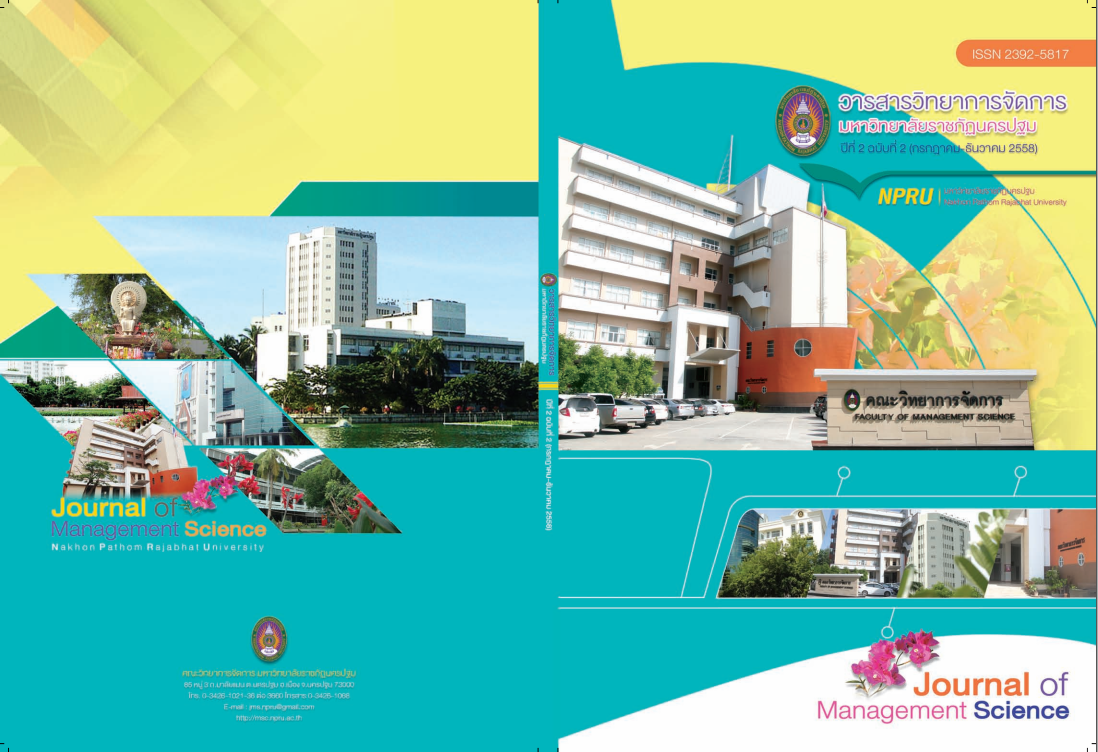Leadership and Organizational Culture Favorable to the Success of Modern Organization Development : A Case Study of Metropolitan Operating Line of Thai Postage Company
Main Article Content
Abstract
The objectives of the study are founded : 1) to determine the leadership and organizational culture favorable to the success of modern organization development in the Metropolitical Operating line of Thai Postage Company Limited ; 2) to compare the employees’ personal backgrounds in relation to leadership and organizational culture ; 3) to ascertain the relationship between leadership plus organizational culture and the success of modern organization development ; and 4) to find out problems and obstacles together
with recommendations pertaining to leadership and or organizational culture conducive to the success of modern organization development in the case of the Metropolitan Operating line of Thai Postage Company Limited by 400 employees working in the Metropolitan Operating line comprised the sample for the study ; the sample size was determined by Yamane’s formula. The study instruments were a set of self-administered questionnaires and a semi - structured interview guide; the construction of these data - collecting tools was based on theory, conceptual framework and operational definitions
Research findings are concluded as follows:
1. Leadership and organizational culture leading to the success of modern organization development was free-rein or nondirective leadership, the mean score being the highest (X = 3.55), followed by trans formational leadership (X = 3.49) ; meanwhile, exchange-oriented leadership had the least mean score (X = 3.53). As far as the organizational culture factors were concerned, the factors in descending order by strength or degree were as follows: self-adjustment dimension (X = 3.60), mission dimension (X = 3.53), unity dimension (X = 3.56), and participation dimension (X = 3.54).
2. As for the relationship between the employees’ personal backgrounds and leadership plus organizational culture, they failed to differ at the statistical significance level of .05. Regarding the relationship between the leadership style and the success of modern organization development,
the researcher has found the following facts : transformational leadership had a high, positive correlation with the success of modern organization development (r = .843) ; exchange-oriented leadership had a moderate, positive correlation with the success of modern organization development (r = 445) ; and finally,
free-rein leadership had a low, positive correlation with the success of modern organization development (r = 685). In view of the organizational culture and its relationship to the success of modern organization development, the researcher has formal the following : “participation dimension” was positively correlated
with the success of modern organization development (r = 633). “mission dimension” was positively correlated with the success of modern organization development (r = 494). “unity dimension” was positively correlated with the success of modern organization development (r = 392) ; and “self-adjustment
dimension” was positively correlated with the success of modern organization development (X = .268). As a result of multiple regression analysis, it was found that 83% of the success of modern organization development in the case of Thai Postage Company Limited. (Metropolitan Operating Line) was explained
by the leadership factors, whereas 81% of the success of modern development organization development was explained by organizational culture factors.
Article history : Accepted 7 May 2015
SIMILARITY INDEX = 2.88
Article Details
The views and opinions of the article appearing in this journal are those of the author. It is not considered a view and responsibility of the editorial staff.
References
กีรติ ยศยิ่งยง. (2548). การวางแผนการพัฒนาทรัพยากรมนุษย์เชิงกลยุทธ์. กรุงเทพมหานคร : สำนักพิมพ์อริยมรรค.
ธนวรรธ ตั้งสินทรัพย์ศิริ. (2550). พฤติกรรมองค์การ. กรุงเทพมหานคร : บริษัทธนธัชการพิมพ์.
ธีรวุฒิ โศภิษฐิกุล. (2547). การประยุกต์ใช้การร่วมมือเรียนรู้เพื่อการปฏิรูปกระบวนการเรียนการสอนที่ยึดผู้เรียนเป็นสำคัญ. วารสารราชนครินทร์ 1 (มกราคม-เมษายน 2547) : 53-54.
วรภัทร ภูเจริญ. (2548). องค์การแห่งการเรียนรู้และการบริหารความรู้. กรุงเทพฯ : บริษัท อริยชน จำกัด.
สร้อยตระกูล (ติวยานนท์) อรรถมานุ. (2545). พฤติกรรมองค์การ : ทฤษฎีและการประยุกต์(พิมพ์ครั้งที่ 3). กรุงเทพฯ : สำนักพิมพ์มหาวิทยาลัยธรรมศาสตร์.
สิทธิโชค วรานุสันติกุล. (2546). จิตวิทยาสังคม : ทฤษฎีและการประยุกต์ใช้. บริษัทซีเอ็ดยูเคชั่น จำกัด (มหาชน).
อุทัย เลาหวิเชียร. (2542). รัฐประศาสนศาสตร์; ลักษณะวิชาและมิติต่าง ๆ. (พิมพ์ครั้งที่ 3). กรุงเทพมหานคร : สำนักพิมพ์เสมาธรรม.
Denison, D. R. (1990). Corporate Culture and Organizational Effectiveness. New York : JohnWiley & Sons
Johnson, G. (1992). Managing Strategic Change: Strategy, culture and action. Long RangePlanning. 25, 1 (February): 28-36.
Jackson, S.E., Schuler, R.S., & Werner, S. (2009). Managing human resources. Mason, OH: South-Western Cengage Learning.
Prahalad, C. K. and Bettis, R. A. (1986). The Dominant Logic : A New Linkage Between Diversityand Performance. StrategicManagement Journal. 7, 1 (November/December): 485-501.
Reed, R. and Defillippi, R. J. (1990). Causal Ambiguity, Barriers to Imitation, and SustainableCompetitive Advantage. Academy of Management Review. 15, 1 (January): 88-102.
Scholz, C. (1987). Corporate Culture and Strategy: The Problem of Strategic Fit. Long RangPlanning. 20, 4 (August): 78-87.
Yamane, T. (1967). Statistic : An introductory analysis. (2nd ed.). NewYork : Harper & Row.


